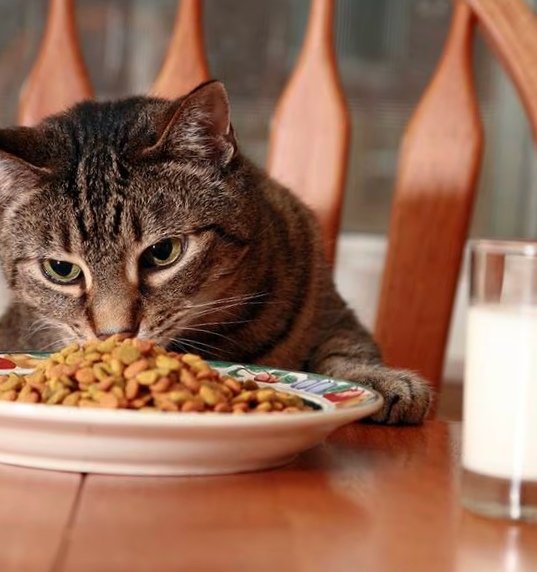As a cat owner, it is natural to want to share your snacks with your furry friend. However, when it comes to peanuts, it is best to keep them out of reach of your cat’s paws. When feeding our feline friends, it’s crucial to be cautious about what foods we introduce into their diet. Peanuts, a popular snack for humans, often raise questions among cat owners: Are peanuts bad for cats?
Peanuts are a tasty snack for humans but can be a toxic trap for our furry friends. Sharing a peanut or two with your cat may seem harmless, but the consequences can be severe.
When feeding our feline friends, it’s crucial to be cautious about what foods we introduce into their diet. Peanuts, a popular snack for humans, often raise questions among cat owners: Are peanuts bad for cats?
In this article, we will see the potential risks and benefits of feeding peanuts to cats, helping you make informed decisions about your pet’s diet.
Understanding Cat Nutrition
Understanding cat nutrition is crucial for providing your feline friend with a healthy and balanced diet. Cats are obligate carnivores, requiring a diet rich in protein from animal sources, such as meat. They also need essential nutrients like taurine, fatty acids, and specific vitamins and minerals.
Carbohydrates, on the other hand, are not a necessary component of a cat’s diet, so opt for low-carb or grain-free options. Additionally, ensure access to fresh water at all times and choose a food suitable for your cat’s life stage, whether it’s kittenhood, adulthood, or seniorhood.
Are Peanuts Bad for Cats?
Peanuts are not toxic to cats, but it is not recommended to feed them peanuts either. Cats have an allergic reaction to peanuts, and they can develop digestive issues or become overweight if they eat them regularly.
Peanuts are rich in protein and they also contain a high amount of xanthine, which. can cause toxic reactions. Even small amounts of peanuts can be very harmful to cats, and the severity of the symptoms depends on the amount consumed.
Moreover, peanuts can also cause choking hazards, bacterial contamination, and other health issues.
Can Cats Eat Peanuts?
Yes, cats can eat peanuts, but there are a few exceptions. While peanuts are not toxic to cats, they are not recommended as a regular part of a cat’s diet because they can cause problems for them. Here are some problems include the following:
Digestive Issues
Cats have a digestive system that is primarily designed for processing meat. The high fat content in peanuts can lead to gastric upset, including diarrhea and vomiting.
Allergies
Just like humans, cats can develop allergies. Peanuts are a common allergen, and allergic reactions can range from mild itching and skin irritation.
Choking Hazard
Whole peanuts, especially with shells, can be a choking hazard for cats. They might have trouble chewing and swallowing them, which can cause blockages in their digestive system.
Bacterial contamination
Improperly stored peanuts can develop mold or bacterial growth, which can be harmful to cats.
Potential Benefits
Despite the risks, there are a few potential benefits if peanuts are given in very small, controlled amounts:
Protein and Fat
The protein and fat in peanuts can provide a quick energy boost, although it is more appropriate for animals with higher energy needs, such as dogs.
Bonding Treat
Occasionally, a small piece of plain, unsalted peanut can be used as a treat to bond with your cat, especially if they show interest in this human snack.
How to Feed Peanuts to Cats
Feeding peanuts to cats is not recommended, but if you still want to give peanuts to your cat, here are some guidelines to minimize potential harm:
Plain and Unsalted
Only give plain, unsalted peanuts. Avoid any flavored or coated varieties, which can contain harmful additives and excessive salt.
Small Quantities
Limit the amount to a very small piece and observe your cat for any adverse reactions.
Crush or Grind Peanuts
Whole peanuts can be a choking hazard, so grind or crush them into small pieces.
Mix with their regular food
Combine peanuts with their regular meals to prevent over-consumption.
Symptoms of Peanut Toxicity in Cats
If your cat has ingested peanuts, it’s essential to watch out for the following symptoms:
- Vomiting
- Diarrhea
- Increased heart rate
- Hyperactivity
- Tremors
- Seizures
If you observe any of these symptoms, contact your veterinarian immediately.
Safe Alternatives to Peanuts
If you are looking for safe alternatives to peanuts for your cat, consider the following options:
1-Commercial Cat Treats
Specifically designed to meet the dietary needs of cats, these treats are a safer option.
2-Cooked Meat
Small pieces of cooked chicken or turkey can be a protein-rich treat.
3-Catnip or Cat Grass
These natural treats are safe and can provide stimulation and enjoyment for your cat.
People Also Ask
Here are some common questions about: Are Peanuts Bad for Cats?
Are Peanuts Bad for Cats?
While peanuts are not toxic to cats, they are not very nutritious for them either. Cats are obligate carnivores, indicating their essential need for animal protein to thrive. Peanuts are also high in fat, which can cause obesity and pancreatitis in cats if fed too often or in large amounts.
Is peanut butter safe for cats?
Yes, peanut butter is safe for cats in small amounts, particularly if it is free of sugar, salt, and other additives. However, it should not be given as their main food or in large quantities.
Learn More About: Is it okay for cat’s to eat bread with butter?
Conclusion
In conclusion, while small amounts of plain peanut butter may be safe for cats, whole peanuts pose significant risks, including choking and digestive blockages. Cats have a digestive system designed for meat, so it’s best to avoid giving them peanuts or peanut products.instead opt for treats that are specifically designed for cats to ensure their health.
Always consult your veterinarian before introducing any new food to your cat’s diet.
